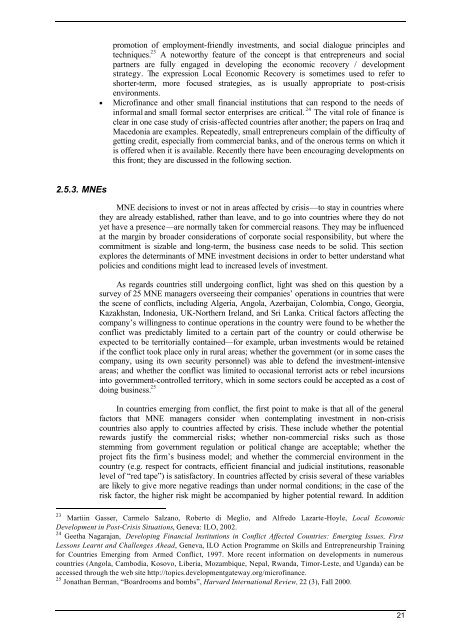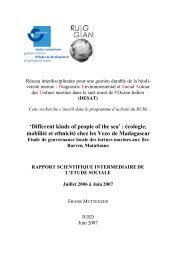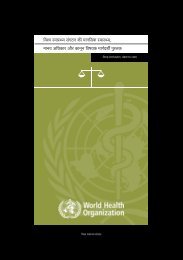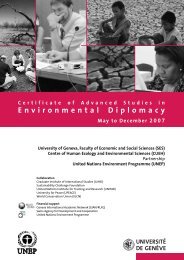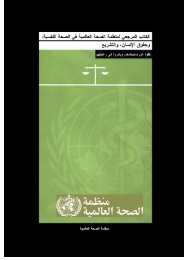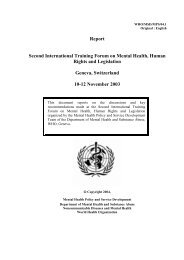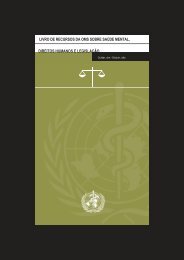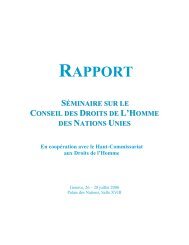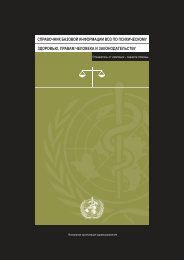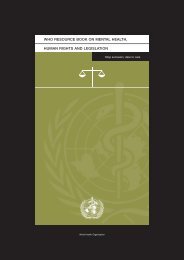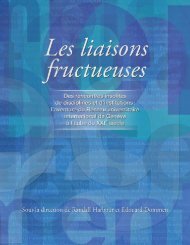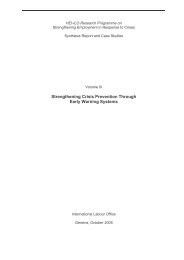Box 1: How does Somalia’s private sector cope without government?Private business has done surprisingly well in Somalia although government has been extremely weak or absent in major partsof the country since 1991.In spite of very rudimentary finance and infrastructure services, private business has thrived in vital sectors (e.g. retail,construction) where transactions can be kept simple. Results achieved by private entrepreneurs have also been impressivein more complex or capital-intensive sectors (e.g. telecommunications, electricity) though some of the solutions may havebeen far from ideal. Even in some activities traditionally reserved for the public sectors (e.g. legal and education systems,monetary policy), where the absence of government can severely jeopardize development, the private sector has been ableto find creative solutions.Although there have been many failings, the large number of success stories is nevertheless striking and attests to the vitalityand resourcefulness of private business in even the most inhospitable environments.The factors that have helped to foster the natural drive of private entrepreneurs can be summarized as follows:a) “importing governance” by using foreign institutions and networks where these are missing locally ( e.g.airline safety);b) “relying on clan systems and networks of trust” to help with contract enforcement, and international andnational fund transfers (hawala system and rotating credit associations);c) “simplifying transactions” and breaking down operations into parts that are manageable by privateentrepreneurs without government or outside help.Conclusion: “For governments and aid agencies, the capability of some business sectors to cope under the most difficultconditions should give hope and guidance in other reconstruction efforts. It may take less encouragement than is commonlythought for stripped-down systems of finance, electricity, and telecommunications to grow.”This summary is based on an article co-authored by Tatiana Nenova and Tim Harford of the World Bank-International FinanceCorporation. It can be found at http://rru.worldbank.org/PublicPolicyJournal. The article generated a rich discussion on therelative roles of the private sector and government in weak states. This discussion may be accessed through the same site.2.5.2. SMEsThe ILO, the World Bank and other relevant IGOs have well-tried policy tools thatare appropriate for promoting local economic development and SMEs in general. 21 Suitablyadapted, these are appropriate for use in crisis response, in both conflict- and disasteraffectedcountries. They include:• Assistance with public employment services, which are needed as much by enterprisesas by government and job-seekers, and which play a critical role in crisis response.• Employment-intensive infrastructure reconstruction not only makes it possible forlocal firms and workers to capture a larger share of the reconstruction expenditure thanother approaches. It can also be competitive in terms of cost and quality, and thosetypes of projects where it excels (such as rural roads, and irrigation schemes) benefitespecially rural areas, which are too frequently neglected in reconstructionprogrammes. It is important to pay sufficient attention to the identification,development and training of local contractors who know how to use these techniques. 22In Ghana, associations of labour-based contractors have recently been established, andthey have multiplied the impact of ILO training programmes.• The concept of Local Economic Development not only is compatible with but dependscritically on the participation of the private sector. Its tools include businessdevelopment services, employability enhancement, social finance schemes, the21 A. Tolentino, Guidelines for the analysis of policies and programmes for small and medium enterprisedevelopment, ILO, Enterprise and Management Development Working Paper EMD/13/E.22 Peter Bentall, Andreas Beusch and Jan de Veen, Employment-Intensive Infrastructure Programmes: CapacityBuilding for Contracting in the Construction Sector—Guidelines, Geneva: ILO, 1999; and ILO, Employmentintensive reconstruction works in countries emerging from armed conflicts—Guidelines, 1999.20
promotion of employment-friendly investments, and social dialogue principles andtechniques. 23 A noteworthy feature of the concept is that entrepreneurs and socialpartners are fully engaged in developing the economic recovery / developmentstrategy. The expression Local Economic Recovery is sometimes used to refer toshorter-term, more focused strategies, as is usually appropriate to post-crisisenvironments.• Microfinance and other small financial institutions that can respond to the needs ofinformal and small formal sector enterprises are critical. 24 The vital role of finance isclear in one case study of crisis-affected countries after another; the papers on Iraq andMacedonia are examples. Repeatedly, small entrepreneurs complain of the difficulty ofgetting credit, especially from commercial banks, and of the onerous terms on which itis offered when it is available. Recently there have been encouraging developments onthis front; they are discussed in the following section.2.5.3. MNEsMNE decisions to invest or not in areas affected by crisis—to stay in countries wherethey are already established, rather than leave, and to go into countries where they do notyet have a presence—are normally taken for commercial reasons. They may be influencedat the margin by broader considerations of corporate social responsibility, but where thecommitment is sizable and long-term, the business case needs to be solid. This sectionexplores the determinants of MNE investment decisions in order to better understand whatpolicies and conditions might lead to increased levels of investment.As regards countries still undergoing conflict, light was shed on this question by asurvey of 25 MNE managers overseeing their companies’ operations in countries that werethe scene of conflicts, including Algeria, Angola, Azerbaijan, Colombia, Congo, Georgia,Kazakhstan, Indonesia, UK-Northern Ireland, and Sri Lanka. Critical factors affecting thecompany’s willingness to continue operations in the country were found to be whether theconflict was predictably limited to a certain part of the country or could otherwise beexpected to be territorially contained—for example, urban investments would be retainedif the conflict took place only in rural areas; whether the government (or in some cases thecompany, using its own security personnel) was able to defend the investment-intensiveareas; and whether the conflict was limited to occasional terrorist acts or rebel incursionsinto government-controlled territory, which in some sectors could be accepted as a cost ofdoing business. 25In countries emerging from conflict, the first point to make is that all of the generalfactors that MNE managers consider when contemplating investment in non-crisiscountries also apply to countries affected by crisis. These include whether the potentialrewards justify the commercial risks; whether non-commercial risks such as thosestemming from government regulation or political change are acceptable; whether theproject fits the firm’s business model; and whether the commercial environment in thecountry (e.g. respect for contracts, efficient financial and judicial institutions, reasonablelevel of “red tape”) is satisfactory. In countries affected by crisis several of these variablesare likely to give more negative readings than under normal conditions; in the case of therisk factor, the higher risk might be accompanied by higher potential reward. In addition23Martiin Gasser, Carmelo Salzano, Roberto di Meglio, and Alfredo Lazarte-Hoyle, Local EconomicDevelopment in Post-Crisis Situations, Geneva: ILO, 2002.24 Geetha Nagarajan, Developing Financial Institutions in Conflict Affected Countries: Emerging Issues, FirstLessons Learnt and Challenges Ahead, Geneva, ILO Action Programme on Skills and Entrepreneurship Trainingfor Countries Emerging from Armed Conflict, 1997. More recent information on developments in numerouscountries (Angola, Cambodia, Kosovo, Liberia, Mozambique, Nepal, Rwanda, Timor-Leste, and Uganda) can beaccessed through the web site http://topics.developmentgateway.org/microfinance.25 Jonathan Berman, “Boardrooms and bombs”, Harvard International Review, 22 (3), Fall 2000.21
- Page 1 and 2: HEI-ILO Research Programme onStreng
- Page 3: PrefaceThis three-volume series res
- Page 7 and 8: Table of contentsPreface...........
- Page 9: The Private Sector and Social Partn
- Page 13: Executive summaryPrivate enterprise
- Page 16 and 17: IGOs, NGOs—tend to exclude, or at
- Page 18 and 19: • The World Bank has created a kn
- Page 20 and 21: 2. Private enterprises in conflict-
- Page 22 and 23: Figure 1: The Private Sector Employ
- Page 24 and 25: 2.3. Case study: Promoting multi-et
- Page 26 and 27: downstream, i.e. refining and distr
- Page 30 and 31: Sectoral aspectsthere will be added
- Page 32 and 33: inequities in pricing. “Of the 16
- Page 34 and 35: into the armies are thereby also at
- Page 36 and 37: 3. Private enterprises and social p
- Page 38 and 39: Two natural disasters which have be
- Page 40 and 41: Box 4: Cooperatives in crisis respo
- Page 42 and 43: partners, the tripartite cooperatio
- Page 44: 36forces and that are able to perfo
- Page 48: AcknowledgmentsThe authors of this
- Page 51 and 52: 6.2. Delimiters of women’s econom
- Page 54 and 55: Executive summaryDespite the rich n
- Page 56 and 57: 1. IntroductionSince 1979, under th
- Page 58 and 59: 2. Country profileThe Republic of I
- Page 60 and 61: • activities related to reconstru
- Page 62 and 63: for university education concerning
- Page 64 and 65: 2.4. Economic environment assessmen
- Page 66 and 67: Unemployment (15 years of age and a
- Page 68 and 69: 2.5. PerspectivesDespite devastatio
- Page 70 and 71: 3. The rationale of SME sector deve
- Page 72 and 73: 4. Iraq's SME sector: A profile4.1.
- Page 74 and 75: The Private sector employment pyram
- Page 76 and 77: Table 8: Estimates of total formal
- Page 78 and 79:
Feasibility study: almost all respo
- Page 80 and 81:
Table 9: Percentage of female entre
- Page 82 and 83:
Factors for public sector preferenc
- Page 84 and 85:
The recessionary indication of busi
- Page 86 and 87:
Special investment legislation and
- Page 88 and 89:
8. Small entrepreneurs in Iraq: Sto
- Page 90 and 91:
a reasonable income and independenc
- Page 92 and 93:
9. RecommendationsSME-development s
- Page 94 and 95:
Longer-term SME developmentBesides
- Page 96 and 97:
• literature and artistic service
- Page 98 and 99:
2. List of interviews with governme
- Page 100 and 101:
11. Why did you decide establishing
- Page 102 and 103:
33. What are the cost components of
- Page 104 and 105:
59. Are you working on a project, o
- Page 106:
Promoting multi-ethnic stakeholder
- Page 109 and 110:
101
- Page 111 and 112:
103
- Page 113 and 114:
105
- Page 115 and 116:
107
- Page 117 and 118:
109
- Page 119 and 120:
Research methodologyThe research te
- Page 121 and 122:
possibility of conflict. In 1992, a
- Page 123 and 124:
2.2.2. PovertyAfter the break-up of
- Page 125 and 126:
of almost 10 per cent of GDP, yet i
- Page 127 and 128:
Source of initial financing: privat
- Page 129 and 130:
‘It is important to point out tha
- Page 131 and 132:
4.2. The economic resilience of int
- Page 133 and 134:
medium-sized companies employing 24
- Page 135 and 136:
5.2. Addressing constraints for SME
- Page 137 and 138:
5.4. Support to local initiativesSM
- Page 139 and 140:
ConclusionConsidering the actual an
- Page 141 and 142:
Scott, Norman: Macedonia: A Brief E
- Page 143 and 144:
Official gross reserves 4 290 450 7
- Page 145 and 146:
4. Survey questionnaire1. Name of t
- Page 147 and 148:
139
- Page 149 and 150:
141
- Page 151 and 152:
143
- Page 153 and 154:
2. Le contexte2.1. Le paradoxe ango
- Page 155 and 156:
Composition et description des Futu
- Page 157 and 158:
Les généraux angolais sont prése
- Page 159 and 160:
Les syndicats officielsL’Union na
- Page 161 and 162:
Une étude réalisée en 2003 pour
- Page 163 and 164:
3.3. Sortir du cercle vicieux : vie
- Page 165 and 166:
Annexes1. Morceaux choisis : le «
- Page 167 and 168:
159
- Page 169 and 170:
L’implication des partenaires soc
- Page 171 and 172:
Table des matièresTable des matiè
- Page 173 and 174:
RemerciementsQu’il me soit permis
- Page 175 and 176:
Liste des acronymesAFASPAALEANEAANS
- Page 177 and 178:
GlossaireAide d’urgence :Aléa :A
- Page 179 and 180:
Résumé exécutifAu cours des dix
- Page 181 and 182:
1. IntroductionLe département de R
- Page 183 and 184:
Limites de l’étudeAvant de proc
- Page 185 and 186:
évalué à plus de deux milliards
- Page 187 and 188:
2.2.2. Aspects démographiquesLes p
- Page 189 and 190:
2.3.3. EducationDès l’indépenda
- Page 191 and 192:
création de fonds de stabilisation
- Page 193 and 194:
3. Analyse des formes de réponse :
- Page 195 and 196:
• le secteur de l’Eau sera dest
- Page 197 and 198:
• la révision de la législation
- Page 199 and 200:
de main-d’œuvre, encourageant la
- Page 201 and 202:
leur fournissait les équipements e
- Page 203 and 204:
matérielle sous des formes diverse
- Page 205 and 206:
centre de l’attention des partena
- Page 207 and 208:
• le rôle dévolu à la commissi
- Page 209 and 210:
Renforcer le rôle de solidarité d
- Page 211 and 212:
ConclusionLa dimension de la tache
- Page 213 and 214:
Equipe Multidisciplinaire pour l’
- Page 215 and 216:
2. Séries statistiquesTable 8 : Ev
- Page 217 and 218:
Table 11 : Répartition de la popul
- Page 219 and 220:
Table 2 : Liste détaillée des com
- Page 221 and 222:
Table 4 : Dispositif d’interventi
- Page 223 and 224:
Organisation de l’unité syndical
- Page 225 and 226:
- Centre technique de construction.
- Page 227:
219


